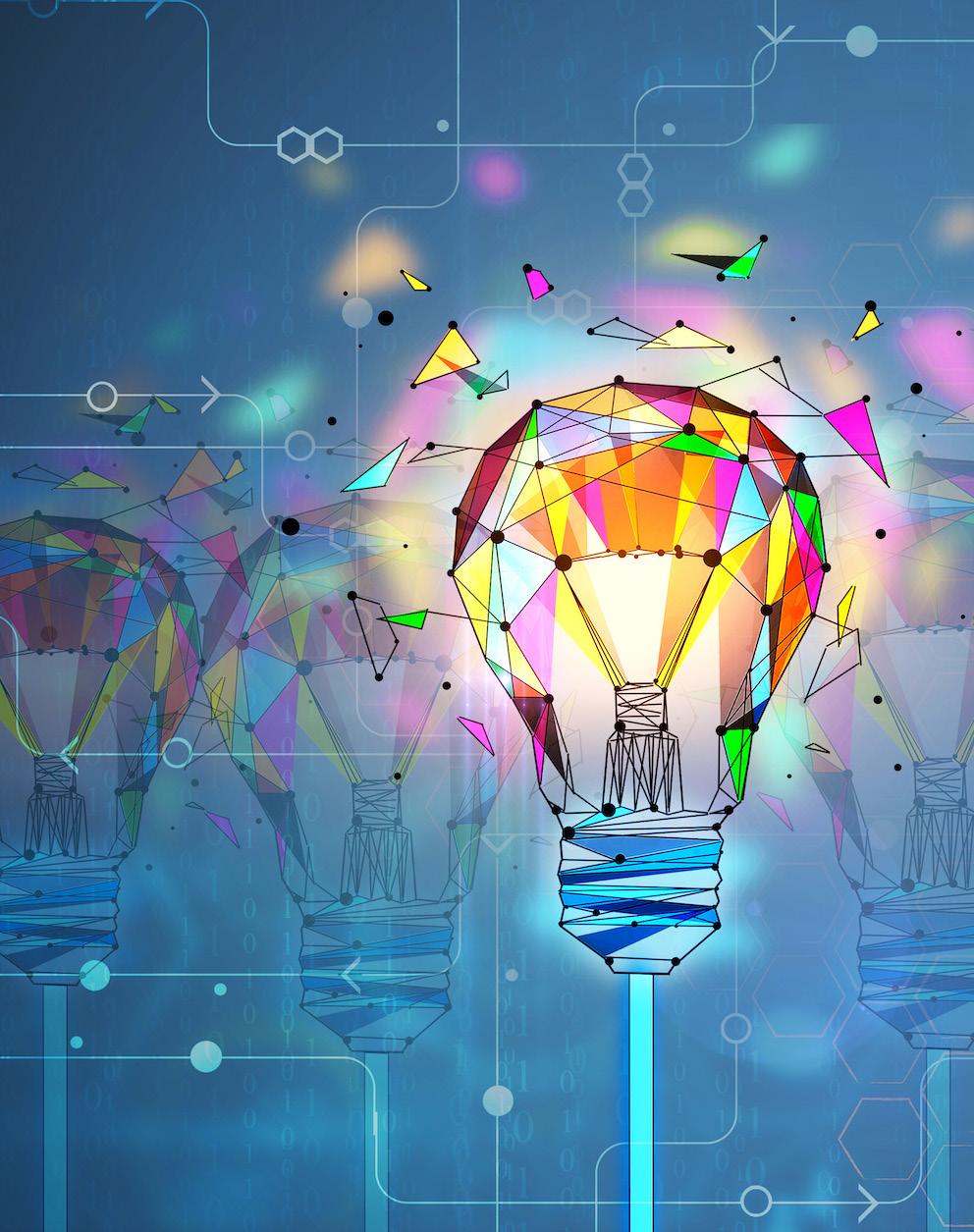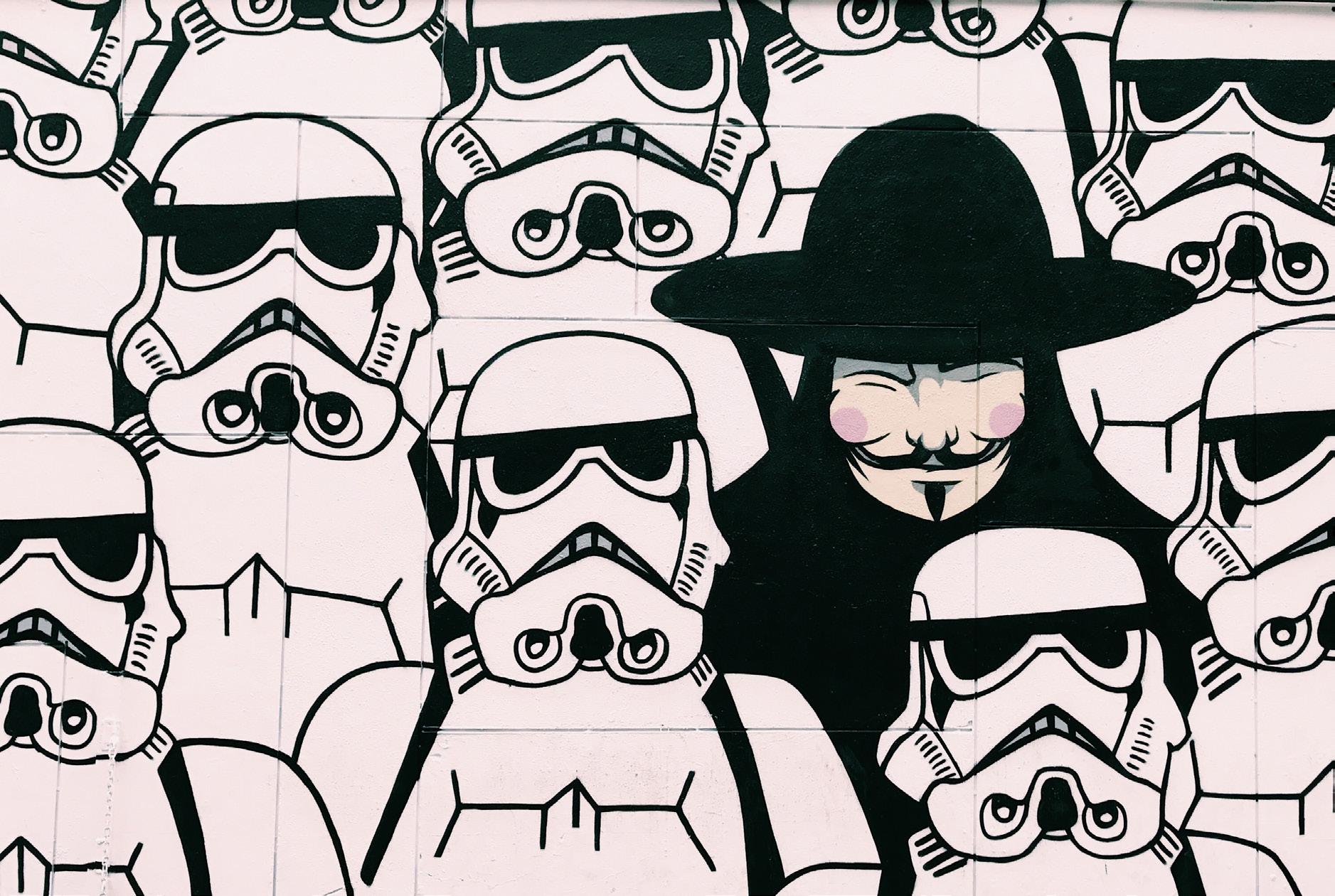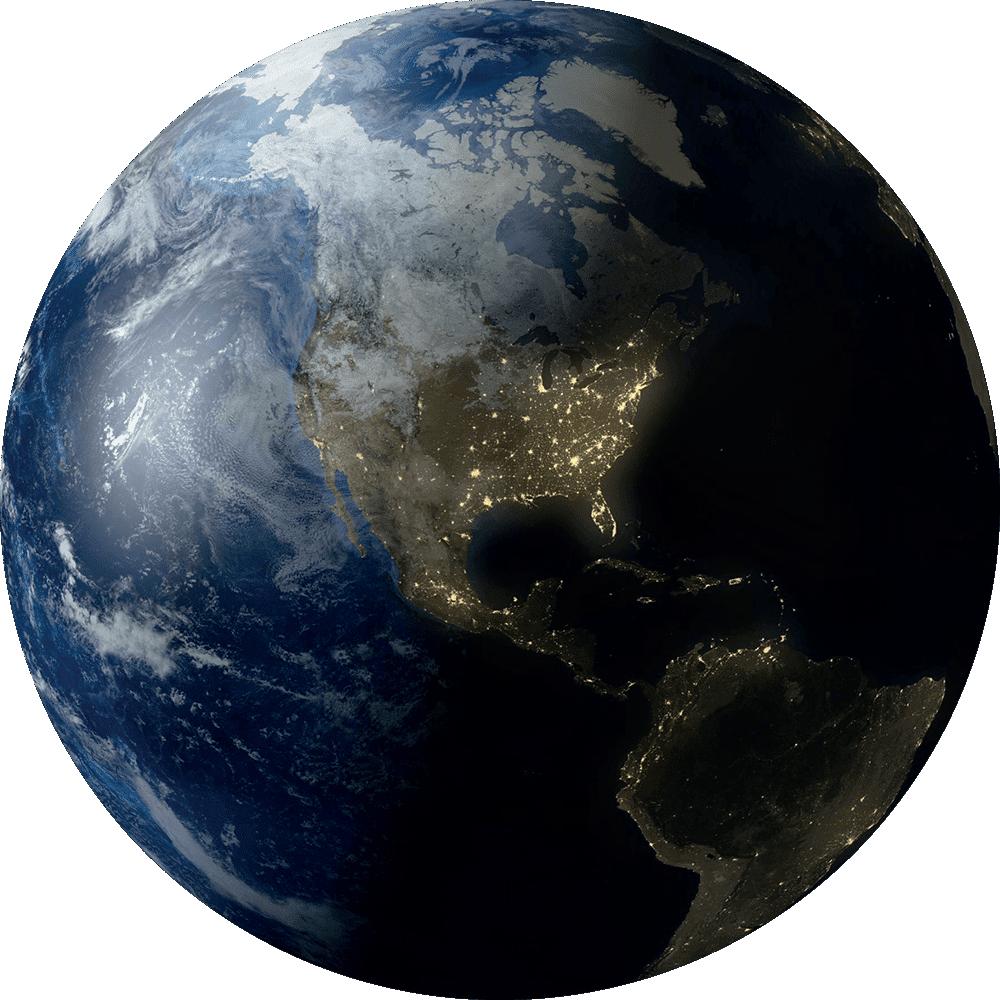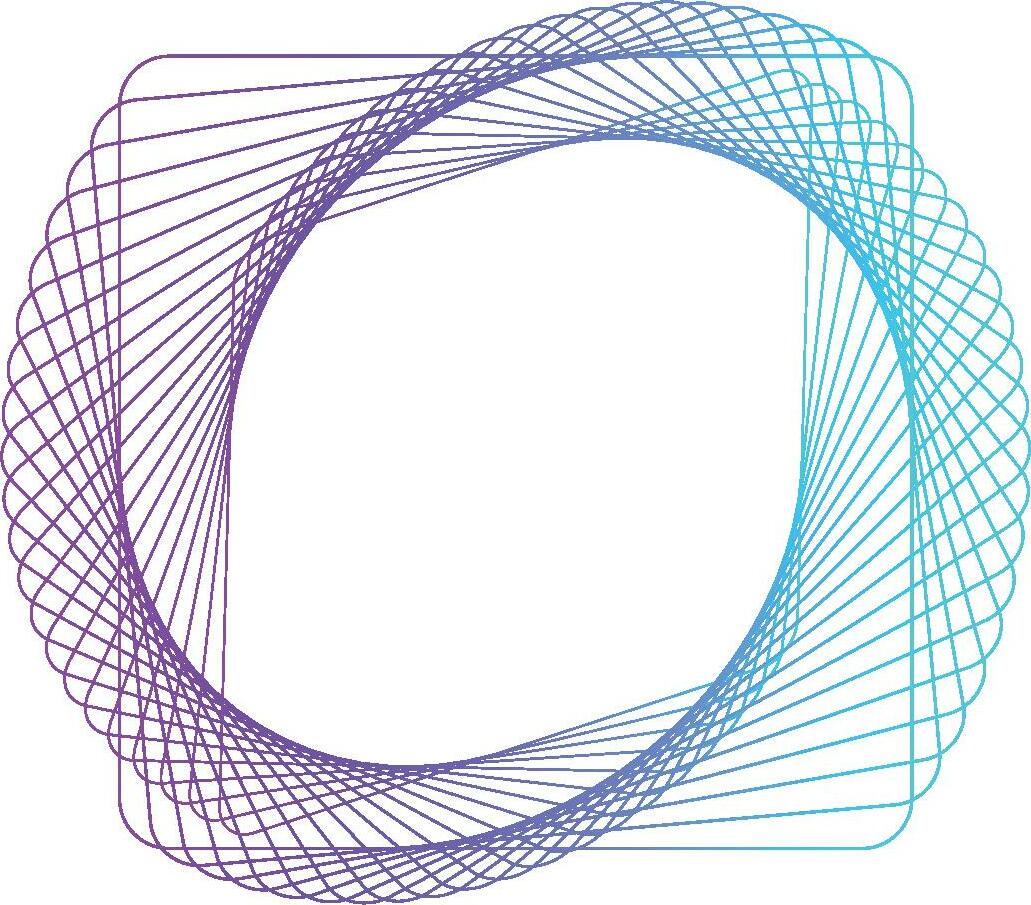

HELPING THE FUTURE ARRIVE WELL Outcomes from World in 2050’s Innovation Lab


2 | JANUARY 2023 ADVERTISEMENT
CEO & FOUNDER ANA C. ROLD
CIO & CO-FOUNDER KELLY R. BAILEY
ART DIRECTOR MARC GARFIELD
TEAM
EXECUTIVE DIRECTOR SHANE SZARKOWSKI
SPECIAL SERIES EDITOR WINONA ROYLANCE
MULTIMEDIA MANAGER WHITNEY DEVRIES
ADVISORS
ANDREA BONIME-BLANC CHRIS PURIFOY DANIELLE DE LA FUENTE DANTE DISPARTE DOMINIC REGESTER
FAYE HOBSON GARIF YALAK
JACKSON SMITH LISA CHRISTEN LISA GABLE LOUKA PARRY MANJULA DISSANAYAKE MARCO STUTZ STEFAN HIMMELSTOSS
INNOVATION LAB DELEGATES
AARAJ VIJ ABBY ROBINSON ADAM RATZLAFF AHMED BAGHDADY ALTHENA BJORBACK ANA ROLD ANASTASIA DELLACCIO ANDREA BONIME-BLANC BLAIR GLENCORSE BRENNAN ROSE CAROL O’DONNELL CHARLOTTE MUEER CHLOE AUTIO DANIELLE DE LA FUENTE DAVID YOUNG DOMINIC REGESTER ERIN BILLERI
EVA KEIFFENHEIM
FAYE HOBSON HUGO PAUL IDA ABDALKHANI JANE COFFIN
JENNIFER DUNN JEREMY FUGLEBERG JESSICA GRAHAM JOANN MCPIKE JOE TOSCANO JOSHUA HUMINSKI JULIE RAY KADER SEVINC KAY FLOYD
KELLY RYAN BAILEY LAILA ABU QATOUSAH LASSE LEPONIEMI LEONOR DIAZ ALCANTARA LISA CHRISTEN LISA GABLE LOUKA PARRY LUIS ALBERTO CAMARGO MANJULA DISSANAYAKE MARCO STUTZ MARIAM SAFI MARIO VASILESCU MARK TEMNYCKY MARY HELEN POMBO MATT GEE MILLIE BRIGAUD NICOLE GOLDIN NOAH SOBE OLLIE BRAY PATRICE JUAH RADHIKA ROHIT SADAF TAIMUR SARAH JONES SARAH KASS SAUL GARLICK SHAILENDRA SHARMA SHANE SZARKOWSKI STEFAN HIMMELSTOSS TOM PLANT TRACEY BURNS WHITNEY DEVRIES

WORLD IN 2050 | 3
Copyright © by World in 2050/Medauras Global Publishing 2023. All rights reserved under International and Pan-American Copyright Conventions. Published in the United States by Medauras Global and World in 2050.
LEGAL NOTICE. No part of this publication may be reproduced in any form—except brief excerpts for the purpose of review—without written consent from the publisher and author. Every effort has been made to ensure the accuracy of information in this publication; however, the author, World in 2050, and Medauras Global make no warranties, express or implied, in regards to the information and disclaim all liability for any loss, damages, errors, or omissions.
DELEGATES. The list of names in the previous page is one of all delegates who took part in our Innovation Lab and agreed to have their names published. We intentionally left out professional affiliation, as all delegates took part in the lab as private individuals and not on behalf of any entity.
PERMISSIONS. This report cannot be reproduced without the permission of the author and the publisher. For permissions please email: info@ medauras.com with your written request.
ACKNOWLEDGMENTS. World in 2050 would like to take a moment to thank the wonderful team at Unleesh for providing a great digital platform for our Innovation Lab, and being valuable learning partners.

05 I Welcome 07 I Introduction & Format 07 I Democratize Control of Exponential Technologies 09 I Tech Standards are More Important Than Tech Regulations 10 I Individuals—Not
be at the Center of Education, Work 13 I Focus Should be on Mitigating, Not Defeating Climate Change 14 I Rethink How We Communicate for Better Climate Action 17 I Helping the Future Arrive Well 18 I Turning from the Beaten Path 19 I A Community of Action Contents WORLD IN 2050 I JANUARY 2023
Institutions—Must
4 | JANUARY 2023
Photo by Alex Wong via Unsplash.
Shane Szarkowski Executive Director, World in 2050

From climate to crypto; the future of education to energy security; the erosion of trust global institutions to the erosion of social cohesiveness to anxiety of the future of AI, our world faces a bevy of intractable challenges. These challenges aren’t just legion, they’re overlapping and mutually reinforcing.
But so are the solutions.
Many of the answers are known but we have a trust and communication deficit. World in 2050 was founded with the idea of creating a productive workspace for solutions. This year, we launched our inaugural Innovation Lab, which convened delegates with a varied expertise, age, identity, and geography, to carry out a collective intelligence experiment.
There are, of course, design challenges with an inclusive exercise such as this one. How do you bring together stakeholders from six continents and twice as many time zones in a way that feels productive, connecting, and meaningful? How do you ask the right questions to launch conversations that go somewhere organic when your stakeholders don’t come from a well-understood sample of the population? The challenges were also part of what made the project exciting. These challenges existed because we were (and are) trying to do something uncommon.
The outcomes, we feel, justified the effort. Ultimately, this Innovation Lab was also a pilot. It would have been successful if it only taught us how to build a better next iteration. It did that, but it also did something unexpected. It built an ecosystem of ideas around how we should reframe and rethink the challenges facing us so that we can move forward more productively. This ecosystem isn’t a list of answers or policy recommendations. Instead, it’s a loose set of insights into what we’ve been doing that’s unhelpful and what we may be able to do that can be better.
We hope these insights will be valuable to you. We know they will help us continue to evolve our community of action as we keep working to “help the future arrive well.”
WORLD IN 2050 I JANUARY 2023
Welcome
WORLD IN 2050 | 5
Helping the Future Arrive Well Outcomes from World in 2050’s Innovation Lab
 Photo by Ian Dooley via Unsplash.
Photo by Ian Dooley via Unsplash.
Our inaugural Innovation Lab was a collective intelligence exercise, bringing together a large group of people to seek solutions to societal issues, collaboratively. We convened 60 delegates from five continents and two dozen countries, with ages ranging from 20 to 70. They included corporate executives, senior former government officials, civil society representatives, entrepreneurs, and exceptional students. Delegates were divided into committees exploring five issue areas, clustered around World in 2050’s five megatrends. These are:
1. Exponential technologies are radically reshaping the world;
2. Disruption from climate change, energy transition is only beginning;
3. The workplace cares less about education, more about skills;
4. Societal distrust and fragmentation are surging;
5. Democratic, governance institutions are under pressure.
Each committee considered a number of macro-issues around their theme, with discussions being considered through the lens of the Three Horizons Model, first developed by Bill Sharpe of the International Futures Forum. This model asks us to consider pathways into the future through three timeframes:
• Horizon One: Current Situation (2020s). What do present norms look like, good and bad? What in our “business as usual” world now is dying or should die, and how can we help it leave well?
• Horizon Two: Short-Term Future (2030s). What are the disruptions along the way? What are our points of volatility, and how can we mitigate the ills while empowering positive changes?
• Horizon Three: Long-Term Future (2050). What is an optimal arrival point for a long-term future state? What might arrive and how can we help it arrive well?
The Innovation Lab lasted three months. Delegates carried out discussions digitally and via supplemental zoom calls, all under Chatham House Rules. In observance of these rules, we have paraphrased and left unattributed any quotes from delegates.
KEY TAKEAWAYS
Our delegates came up with a variety of insights which we have collected and will learn from. Here are some takeaways which felt particularly outside what is commonly discussed, and which got a lot of attention within the committees.
1. We need to democratize governance of exponential technologies.
2. Tech standards are more important than tech regulations.
3. Individuals, not institutions, must be at the center of education and work.
4. Focus should be on mitigating, not defeating Climate Change.
5. We need to rethink how we communicate for better climate action.
6. Digital literacy is key to healing fractured societies.
Democratize Control of Exponential Technologies
Exponential technologies consist of those technologies, mostly digital, which are both innovating and changing society at an exponential rate and include AI, machine learning, blockchain, etc. Governance of those technologies remains in the hands of humans,
WORLD IN 2050 I JANUARY 2023 WORLD IN 2050 | 7
despite alarming warnings of a dystopic future within science fiction. Yet that governance is flawed, being neither equitable nor inclusive. Governance has been largely relegated to corporations and governments, leaving individuals little agency over the tech, which has become an irreplaceable part of their lives. This has largely been a choice, with individuals giving away any role in governance decision making because doing so is convenient, while final products are consumer friendly and powerful.
This preference for convenience over agency creates an unhealthy governance ecosystem. Consumers have largely outsourced their right to have a say in exponential tech innovation, relying on regulatory bodies that have proven inadequate to the task. This leaves a gap which corporations have been happy to fill, resulting in less transparency or commitment to societal wellbeing. Beyond questions of choice, regional and
identity-based disparities in equitability remain intensely problematic.
Exponential technologies are and will remain a key component of confronting a whole bevy of burgeoning global issues. To reach a better world in 2050, we must ensure healthy individual agency in relation to exponential tech, thus ensuring that solutions to our problems are also inclusive and equitable.

Governance has been largely relegated to corporations and governments, leaving individuals little agency over the tech, which has become an irreplaceable part of their lives.
8 | JANUARY 2023
Photo by Chris Hardy via Unsplash.
HORIZONS
1. First Horizon: Corporations are largely in “control” of innovations and how they’re used. Regulators struggle to keep up to ensure proper use. Consumers have been largely apathetic about control due to usefulness and convenience of tech.
2. Second Horizon: Individuals become more engaged with what innovations are and how they are used/how they impact their lives. Regulators may struggle to respond, corporations will respond when profitable.
3. Third Horizon: Regulatory landscapes and corporate standard practice are more transparent and responsive, while technological innovations (and individual control over how we interact with them) are widely and equitably accessible.
QUOTABLES
• Access to technologies is inequitable around the world and within nations for a variety of reasons, but investment in inclusive connectivity infrastructure and teaching better digital literacy— particularly toward advancing public goods and services—can redress this.
• Some governments are themselves bad actors and work intentionally to take control away from individuals, indoctrinating and affecting behavior.
• Individuals are making matters worse with their personal choices. Convenience has created a slippery slope as we find ourselves deferring to technology even now, whether with Alexa or the use of
robotics for elder care—and we could end up displacing teachers with tech due to teacher shortages, losing critical human interaction in these education systems.
• Personal data privacy will be a critical part of ensuring individual control and agency, and we can reach this well before 2050 through blockchain. However, there are good and bad use cases for blockchain so more efficient forms such as Proof-of-Stake (as opposed to Proof-of-Work) blockchain should be adopted.
• Establishing standards for “digital self-determination,” maybe through some kind of bill of rights for consumers, could help protect users from exploitation.
Tech Standards are More Important Than Tech Regulations
Good regulation can’t keep up with the pace of exponential tech innovation. Worse, some regulators don’t have societal good in mind when they design regulations. Typical conversations today revolve around making regulation more efficient, while alternate perspectives suggest maybe we need slower and more manageable innovation. Both suggestions carry dangers. We could instead focus on building an infrastructure of ethical and practical standards for exponential technologies.
Such an infrastructure would specify standards regarding acceptable use cases for exponential technologies, what transparency and access look like, and any other standards that make sense for creating an ecosystem of best practice that could be signed on by stakeholders. Rather than regulating on a granular level, this infrastructure creates guiding principles applicable to all innovation, thus empowering consumers, investors, and regulators even as innovations continue to speed up.
WORLD IN 2050 I JANUARY 2023 WORLD IN 2050 | 9
HORIZONS
1. First Horizon: Innovation outpaces the ability and willingness of authorities to regulate. Regulatory guardrails that exist are insufficient to the task, meaning innovations often have unexpected and undesirable impacts on society.
2. Second Horizon: Innovation speeds up, often in unexpected ways. Regulators, innovators, investors, and civil society could collaborate to begin promulgating a set of guiding principles that applies to all innovation.
3. Third Horizon: Innovation moves as fast as it can, but a robust set of guiding principles is in place and signed onto by stakeholders from governments to corporations to institutional investors. Innovators use these guiding principles in their design and privilege transparency of good practice to encourage investors, and regulators act as inspectors general rather than rule makers.
QUOTABLES
• Innovation is getting faster. Quantum computing will soon accelerate all aspects of exponential technologies, good and bad, by strengthening the computation power or speed behind everything, including AI.
• It is increasingly difficult for most of us to keep up with the rate of change in technology to understand how it impacts our lives and to use it for (or discern whether it is being used for) its intended purpose. As processing speed of tech grows exponentially, this problem will only get worse.
• Cryptocurrency is a great example of innovation outpacing good
practice. It was made specifically to bypass financial regulation. It hyper-financializes everything it touches with a focus on speculation, with accompanying degradation of integrity, attraction of scams, and addition of volatility.
Individuals—Not Institutions—Must be at the Center of Education, Work
Over the past several decades, we’ve optimized our labor markets for more efficient production while maximizing corporate quarterly returns. We’ve optimized our education systems for building specific types of citizens and more productive workers. This system is already being disrupted, and this disruption will get more pronounced. We should look at this as an opportunity to unseat established, unhealthy paradigms which currently privilege metrics of success which don’t consider the needs of individuals.
This shift is already underway. We already recognize that individual skills arising from a variety of life situations better measure potential in the workplace, upsetting the established relationship between education and work. As education advocates talk about an “education transformation” as opposed to reform, we can imagine a future where the individual (learner or worker) is placed at the center of how these systems operate, thereby making them more human and equitable. While advocates for change are already discussing how to make best use of these disruptions, our World in 2050 delegates suggested something more radical and intertwined.
HORIZONS
1. First Horizon: Education systems are optimized for teaching students how to be productive citizens and workers. Labor markets are optimized to maximize efficient production and financial returns for corporations. But this system is showing severe strain.
10 | JANUARY 2023
2. Second Horizon: The pivot toward skills, as an important way of measuring worker capabilities over degrees, causes turmoil in labor markets and education systems. Organizations that pivot more quickly to individual-empowered learning and work will adapt more easily. Advocating for a more radical shift to inclusion and putting the individual at the center of these systems rather than institutions escalates the pivot.
3. Third Horizon: Production is still high and efficient but not as its own end; rather it is rationalized to meet actual demands. Learning is personalized and takes place throughout one’s life, with foundational
skills taught early, empowering people to make best use of resources available to them throughout their life. The result is less over-production, healthier and happier people, and economies that grow at a more rational pace with less volatility.

WORLD IN 2050 I JANUARY 2023
WORLD IN 2050 | 11
An individual-centric labor market would allow organizations to become more fluid, adapting better and able to find the right worker for the right task more easily, while workers would be empowered rather than restricted by their occupation.
Photo by Markus Spiske via Unsplash.
QUOTABLES
• If they (education institutions and labor markets) don’t work for the individual—which is the atomic unit of any healthy society—then they cannot work long-term at all. The logic of optimizing a system that puts individuals and their happiness second is inhumane— we are here to live, not to maximize business returns.
• I believe in the early years of education, students should learn more about themselves by employing personality development strategies, which could help students learn to empower themselves through education.

• Reforming labor markets to work for the individual would simply be
acknowledging how the internet’s democratization of information has changed everything. With the growth of the knowledge economy, a large portion of the workforce is a hybrid-freelance class, and this will only grow. An individual-centric labor market would allow organizations to become more fluid, adapting better and able to find the right worker for the right task more easily, while workers
12 | JANUARY 2023
Talking about climate impacts rather than climate change can help depoliticize the issue and help those who feel insulated from its impacts now, more clearly imagine.
Photo by Irina Kostenich via Unsplash.
would be empowered rather than restricted by their occupation.
• Making education systems and labor markets work for all individuals will make sure our future is inclusive to all, without leaving those on the margins out. Tech can be a big help here; when used right it empowers us and gives us access to things usually beyond our reach.
Focus Should be on Mitigating, Not Defeating Climate Change
For years we have talked about climate change as a challenge we need to address today to avoid tomorrow’s worst impacts. That is no longer true. While the 1.5C dream isn’t quite dead, it’s no longer even on life support when we consider the extreme political will, trust, and cooperation it would require among our governments and biggest polluting businesses to “beat” climate change. We’re out of time, and we need to face facts.
By turning away from aspirational language of beating climate change we can instead turn to pragmatic conversations about mitigation and remediation, so we can protect as many as possible, as quickly as possible, and build resilience.
This sounds defeatist, but is the opposite. Talking in big ways about aspirational solutions can be overwhelming and is abstract enough that it’s easy to put off action or hand off responsibility. Talking about mitigation in very clear ways that are near term and specific to a region’s needs makes the task more manageable and more urgent. This means action is easier to kick off in a meaningful way, and action spurs action. We know the outline of the big things we need to do to mitigate overall global temperature increase, so the key is to get the ball rolling in the most impactful near-term ways and move to next steps along the way. The innovations we will need when we get there won’t suddenly dry up.
HORIZONS
1. First Horizon: There’s a lot of aspirational language from governments and corporations even as institutions like the IEA sound the alarm about points of no return. Summits on climate change yield more non-binding commitments that act as containers with guidance for future action but little in the way of wins.
2. Second Horizon: Pivoting to talk about mitigation unlocks smarter government spending and brings governments on board which were skeptical of the bigger pivots. The impacts of climate change become more obvious as temperatures rise, but mitigation strategies are in place. The obvious danger of change along with the efficacy of mitigation solutions builds political will for broader action.
3. Third Horizon: We missed the boat for a “best case scenario” of keeping global warming below 1.5C, but temperatures are stable in 2050. Growth continues but with circularity at its core, mitigation strategies helped the most vulnerable abide, and global temperatures begin to come down as carbon removal strategies alongside circularity catch up.
QUOTABLES
• We don’t have the time or the political will to “save” ourselves from climate change. This isn’t pessimism, it’s a fundamental reframing of the policy debate toward triage, emphasizing the most simple and effective strategies, and prioritizing those most vulnerable.
• When it comes to making the moral argument for climate change energy transition, we are out of
WORLD IN 2050 I JANUARY 2023 WORLD IN 2050 | 13
time. The moral argument matters to long-term reconfiguring of systems but we need immediate action.
• Carbon management as opposed to 100% clean energy is gaining momentum and social license as one of the most pragmatic approaches to energy transition, and with the right policy support will make a fast impact.
• Richer countries often expect to be spared from climate change’s worst, but that’s a problem of communication. For instance, the value of Europe’s farmlands is likely to fall by up to 80% in the coming decades due to climate change, but that’s not generally known.
• Talking about climate impacts rather than climate change can help depoliticize the issue and help those who feel insulated from its impacts now, more clearly imagine.
Rethink How We Communicate for Better Climate Action
We struggle to communicate with groups who are skeptical of robust climate action. This is a problem, because we need broad societal buy-in to employ effective nearterm mitigation and longer-term sustainability strategies. Climate advocates often talk about those opposed to robust climate action as “skeptics” or “deniers,” relegating them to the margins in a bid to “get on with the work of saving the world.” Employing these descriptors feels rhetorically satisfying but doing so contributes to an increasingly us-versus-them atmosphere and makes it more difficult to have any kind of conversation. This is particularly ironic as the impacts of climate change won’t discriminate based on where we stand on climate action.
We must have these difficult conversations to take effective action, so those who advocate for robust climate action must rethink
how they engage. We can do better by revisiting our rhetorical toolkit, basing a new strategy around “meeting them where they are,” an approach used in fields as diverse as social work, medicine, and marketing. This means understanding the local, concrete concerns of those you wish to engage with so that it’s possible to have conversations about specific climate change impacts affecting their community and how to mitigate them in a way that is possible. Lastly, a better taxonomy of the climate action reticent can help us to better understand and engage with the variety of reasons someone might be reserved in supporting robust action without painting everyone with the same brush and dismissing them.
HORIZONS
1. First Horizon: There is a big gap between those who advocate robust climate action and those reticent in committing to such action. The issue is politicized, even weaponized, and the us-vs-them atmosphere is extremely tense. Most agree that climate change is real and that something must be done, but the ‘what’ and the ‘how’ is where they get stuck.
2. Second Horizon: A pivot in engagement with the climate action reticent brings about more local- and regional-level buy-in for clearly useful mitigation strategies. This saves lives and money, with the additional benefit of demonstrating the need for climate action.
3. Third Horizon: Disagreements remain, but a more respectful discursive environment that respects the validity and internal logic of opposing viewpoints has allowed for real action, even if it’s been messy. Climate action may not be smooth, but it is effective because resistance to meaningful compromise has dwindled.
14 | JANUARY 2023
QUOTABLES
• Coordinating local, national, and international policies is a huge challenge of trust and political will. More focus on local challenges and empowering local solutions is better for adaptation politics, though international scale politics will be needed for global pacts and strategies.
• Entire swaths of the population are skeptical of scientific authorities because of targeted misinformation campaigns. I struggle to believe that those who are not convinced of climate change at this point can be convinced through education. Instead, there needs to be a societal shift in the narrative about climate change.

• I’m reading a lot about trust erosion across all committees. This idea of radical re-engagement with anti-science individuals feels like a necessary part of a pivot.
• We must learn to have conversations with trust brokers we don’t agree with. The planet is dying, so even though it’s uncomfortable we need to do so to establish those relationships and build rapport.
WORLD IN 2050 I JANUARY 2023
WORLD IN 2050 | 15
Introducing better agents is important. We need more social and emotional learning embedded in curricula along with a reinstatement of more interdisciplinary learning.
Photo by Alex Knight via Unsplash.
Digital Literacy Key to Healing Fractured Societies
Recent polling from Gallup demonstrates that, overall, people the world over are increasingly unhappy. Much of this hinges on a growing trust deficit within and across societies. Populism is eroding trust. Social media algorithms enable groupings where we begin to trust strangers on the other side of the world more than we trust our neighbors and childhood friends. Echo chambers reinforce this fragmentation, and our opinions are evolving into more extreme views. As a result, social cohesion is in trouble and identity politics are becoming ever more complicated and dangerous.

The current toxic, poorly guard railed digital social environment is both a cause and an accelerator of social fragmentation. Misinformation, disinformation, and echo chambers
across the social media landscape make us feel closer to and seen by strangers a long plane flight away than with our own family. A burgeoning infotainment industry feeds off this to generate engagement and content for revenue. Most conversations today about how to do better center around better regulation of online content. This is obviously contentious, as demonstrated by the ongoing controversy with Elon Musk’s takeover of Twitter and the subsequent dismantling of many of the guard rails that did exist there in the inter-
16 | JANUARY 2023
Regulators struggle to balance regulation with democratic concerns over expression, while bad acting states complicate the matter by taking advantage.
Photo by Jon Tyson via Unsplash.
est of free speech. Rather than being stuck in an intractable debate, we can do better by building digital literacy so consumers can make better, more informed decisions about what they consume and how much they trust the information. Some real-world examples, such as Estonia, offer lessons in digital literacy programs that could be adoptable.
HORIZONS
1. First Horizon: Poorly crafted guardrails for online media content and populations that are susceptible to unethical actors, and poorly vetted information exacerbate social tensions. Regulators struggle to balance regulation with democratic concerns over expression, while bad acting states complicate the matter by taking advantage.
2. Second Horizon: Turning toward inclusive, thoughtful digital literacy programs for all ages and identity groups takes some of the pressure off regulatory bodies, as people become more equipped to take responsibility for their own information consumption.
3. Third Horizon: As more of the world’s population gets better at discerning good from bad online information, the profitability of unethical business practice (and the strategic value of state-backed disinformation campaigns) recedes, allowing a healthier environment to flourish, in turn helping to heal some of our societies’ wounds.
QUOTABLES
• We have an information ecosystem that incentivizes rage bait and is both accessible and physically addictive. The system optimizes and monetizes through polarization, and the design of major platforms means that not much time is spent on any one issue to be fully considered. Fix this and you’ve fixed some major pain points.
• We have fewer and fewer opportunities for shared experiences, and
that is further amplified by digital technologies. Previously, we all had to rely on similar sets of news or media, but algorithms now deliver customized content to an “audience of one,” which alienates us.
• We prioritized the wrong features in the digital landscape, maximizing efficiency, profit, and glamour instead of ethics and quality of information. Because this is so lucrative, innovators who are pursuing solutions are falling behind.
• Systemic flaws hold up a mirror to society, exposing how our biases become baked into institutions or processes. So, to address systemic flaws, we need to incorporate mechanisms that address bias.
• Introducing better agents is important. We need more social and emotional learning embedded in curricula along with a reinstatement of more interdisciplinary learning.
• Freedom of expression leaves us vulnerable to outside influence, so our societies should be educated to better understand what is happening. Rather than tweaking our systems we should rethink our education systems and empower people to become educated about digital information risks.
Helping the Future Arrive Well
World in 2050 buys into a handful of basic tenets as part of our core values. We believe that disruption is an opportunity to do better. We believe that the earth is a rocket ship and we’re all crew members with shared ultimate fates. We believe that while we have to be tough on intractable issues facing us, we must find ways to be kind to one another. Finally, we believe that the spirit of fellowship and collaboration these core values entail are the “secret sauce” that will let us work across
WORLD IN 2050 | 17
national and identity boundaries to co-create solutions to help the future arrive well.
This is the basis of how we approach collective intelligence, and we designed our Innovation Lab concept with this firmly in mind.
What the delegates at this inaugural Innovation Lab arrived at were often not solutions in themselves. There was no expectation we would build a roadmap to fixing the world’s problems in one iteration. What we got—and this is something we feel is a big win—is an ecosystem of ideas that encompasses several potentially powerful and disruptive suggestions for where answers might lie.
This ecosystem of ideas offers us perhaps not a roadmap to fixing the world’s problems, but a treasure map that points us in the right direction to find those solutions. And that right direction is well off the beaten path of how we’ve traditionally approached problems.
Turning from the Beaten Path
• Climate change has been treated as a largely technical problem— innovate and invest properly and we win. Yet nobody has been able to effectively tackle the political will gap. Our delegates offered concrete ideas on better communication strategies and a reconceptualization of tactical approach that both address the problem of lacking political will.
• Delegates turned the debate on how to best regulate rapidly evolving exponential technologies on its head, outlining a future where standards make the specifics of regulation less important, improving societal resilience to the dangers of exponential technologies.
• When we talk about our fragmenting societal networks, we talk a lot about things like disinformation and populism and the ills of social media. We talk about how various infotainment outlets play off growing polarization to generate revenue. And we turn to regulators to fix the problem. Much like the issue of consumers giving away their agency over digital tech due to its conveniences, we offload responsibility to regulatory bodies that are just not agile enough to do well. Our delegates offered a wholly separate framework for solving the societal fragmentation puzzle in prioritizing digital literacy, teaching consumers to better curate their own, healthier digital diet.
• Delegates considered the disruption currently taking place in education systems and labor markets. Rather than following usual pathways of troubleshooting for how these systems can be reformed to accommodate disruptions, they instead proposed a radical reimagining of the very purpose of education and work. Finding ways to put individuals—inclusively—at the center of how we design our future education systems and labor markets is a compelling alternative to technical fiddling around the edges of entrenched systems, which think of as natural now.
18 | JANUARY 2023
Left unchanged, the energy matrix is not only vulnerable to climate threats, the reliance on carbon-heavy fuel sources is an economic double jeopardy. on carbon-heavy fuel sources is an economic double jeopardy.
A Community of Action
These conversations and attendant ideas—which World in 2050 has archived in their whole—won’t just sit there waiting for somebody to notice and make use of them. Our delegates have been active in writing about these outcomes in public forums. More to the immediate point, World in 2050 will be convening a suite of Innovation Labs over the coming years, considering the various design lessons we learned during the inaugural program, which will be part of a growing community of action that digs into these radical concepts to propose clear roadmaps to achievable, meaningful progress. These learnings will be communicated through policy playbooks, reports, videos, and other digital media, and convenings—both independent and on the sidelines of international summits.
While Innovation Labs will be a core component of this community of action, the very concept of how we approach collective intelligence doesn’t allow us to think of the community in this exclusionary way. Ideas will flow from these labs through various learning outputs, but it is our goal that all these learnings be accessible not only to our growing community of action—which already numbers in the thousands—but to the broader public. This is how we find solutions to what feel like unsolvable global problems. By remembering we are all crew members on a rocket ship called earth, and all crew members have a purpose in keeping the ship running smoothly.
We’re glad you’re along for the ride.
WORLD IN 2050 | 19














 Photo by Ian Dooley via Unsplash.
Photo by Ian Dooley via Unsplash.









